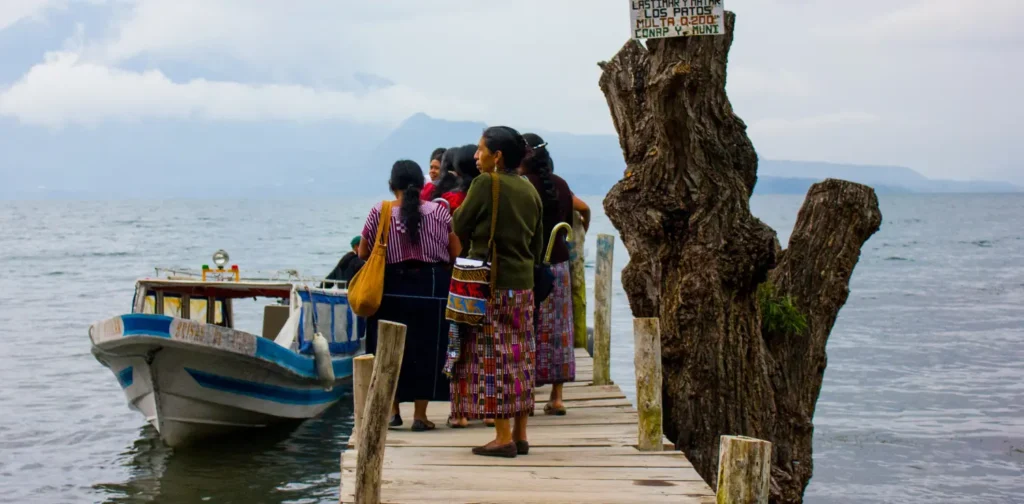The Tz´ununya´ Collective, Indigenous Mayan Women Who Protect Lake Atitlán

Lake Atitlán in Guatemala | Photo by Robin Canfield on Unsplash.
In a world rife with environmental degradation caused by capitalistic greed and willful ignorance, Indigenous communities emerge as stewards of the land. At times, their grassroots movements are the only ones standing against harmful projects or lack of action from major governmental and business entities. For instance, Indigeneous Mayan women formed the Tz’ununya’ Collective to protect Lake Atitlán in Guatemala.
The Degradation of Lake Atitlán
Located in Sololá, Lake Atitlán is the deepest lake in Central America and a major tourist attraction.
For the Indigenous community living by the lake, Lake Atitlán is Qatee’ Ya’, ‘our mother lake’ in the Mayan language Tz’utujil. They say, “She is our ancestor and giver of life. She provides us with food, sustenance, and even calm. When we feel bad or are in pain, we go to the lake. That is why what is happening to our mother hurts us. It hurts to see companies pollute the lake.”
The pollution comes from various sources, such as excessive use of chemicals and fertilizers, wastewater, solid waste, microplastic, erosion, and deforestation. In 2009, Indigenous women alerted municipal and health authorities of San Pedro La Laguna to cyanobacteria in the water that could contaminate the water supply of the 13 towns around the lake. These days, 70% of Lake Atitlán is polluted.
Tz’ununya’ Collective
The Tz’ununya’ Collective is a group of 12 committees of Mayan women dedicated to the conservation of Lake Atitlán and the socialization and preservation of Tz’utujil culture. From beach cleanup to legal battle, they do whatever they can to protect their land and water.
In 2019, a private foundation proposed Mega-Recolector, a project to install sub-aquatic tubes that would collect dirty water and send it to a treatment plan that would produce methane to power three hydroelectric plants. However, it was risky and would only address 14% of the pollution. So, the Indigenous women of the Tz’ununya’ Collective began their legal battle to stop the project.
Besides litigation, the Tz’ununya’ Collective also engages local communities to reduce pollution levels in Lake Atitlán. For instance, they have started transitioning away from chemical fertilizers for farming. They have also proposed the use of biodigesters to treat household wastewater.
Additionally, the Tz’ununya’ Collective organizes a cleanup day at least once a month. About a hundred Indigenous women wade into the water and collect garbage strewn along the beach. Some firefighters also join in, diving to extract tires and iron parts from the bottom of the lake.
Whose Responsibility?
In November 2022, as a protest, the Tz’ununya’ Collective dumped the garbage they had collected in front of the Coordinating Committee of Agricultural, Commercial, Industrial, and Financial Associations facility. A member said, “Companies must assume their commitment to the final disposal of their waste. Because they are turning us into garbage dumps, we are sacrificing land to become garbage dumps.
”Undoubtedly, the Tz’ununya’ Collective was also born out of frustration caused by the inaction and incompetence of those in charge. The Collective maintains that the government and companies must be held accountable and assume responsibility for Lake Atitlán’s pollution.

Co-create positive impact for people and the planet.
Amidst today’s increasingly complex global challenges, equipping yourself, team, and communities with interdisciplinary and cross-sectoral insights on sustainability-related issues and sustainable development is no longer optional — it is a strategic necessity to stay ahead and stay relevant.

Nazalea Kusuma
Naz is the Manager of International Digital Publications at Green Network Asia. She is an experienced and passionate writer, editor, proofreader, translator, and creative designer with over a decade of portfolio. Her history of living in multiple areas across Southeast Asia and studying Urban and Regional Planning exposed her to diverse peoples and cultures, enriching her perspectives and sharpening her intersectionality mindset in her storytelling and advocacy on sustainability-related issues and sustainable development.


 Indian Gig Workers Push Back Against 10-Minute Delivery Service Strain
Indian Gig Workers Push Back Against 10-Minute Delivery Service Strain  Call for Governance: Grassroots Initiatives Look to Scale Efforts to Conserve Depleting Groundwater
Call for Governance: Grassroots Initiatives Look to Scale Efforts to Conserve Depleting Groundwater  Integrating Environment, Climate Change, and Sustainability Issues into Education Systems
Integrating Environment, Climate Change, and Sustainability Issues into Education Systems  Finally Enforced: Understanding the UN High Seas Treaty
Finally Enforced: Understanding the UN High Seas Treaty  Risks and Opportunities of Submarine Communication Cables for Sustainable Development
Risks and Opportunities of Submarine Communication Cables for Sustainable Development  Rising Attacks and Violence Against Land and Environmental Defenders
Rising Attacks and Violence Against Land and Environmental Defenders